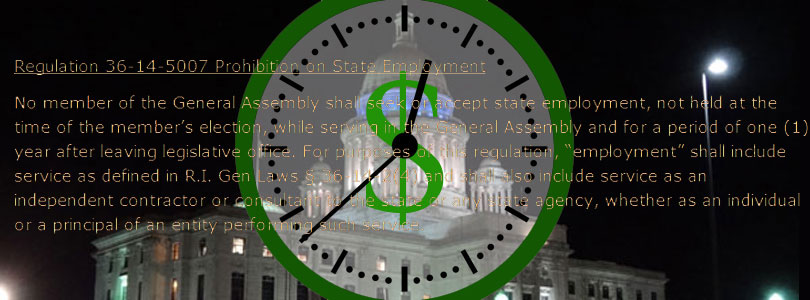Sen. Conley’s Work for State Government in Ethical Gray Area
Last week, the Ocean State Current reported on work that state Senator William J. Conley, Jr., performed as a legal contractor for the State of Rhode Island. Senator Conley declined to comment on the record, but his contract — entered into and paid after he was sworn into office — at least has the potential to be a violation of the state Code of Ethics, and the Ethics Commission should rule on it.
Ethics regulation 36-14-5007 prohibits members of the General Assembly (that is, representatives and senators) from “seek[ing] or accept[ing] state employment,” which includes “service as an independent contractor or consultant to the state or any state agency.” The one exception to the rule that Senator Conley might cite as permitting his contract agreement is that the Code of Ethics permits continued “employment” if the legislator held the job “at the time of… election.”
That exception is clear in instances of direct, payroll employment with the state. Either the person was officially hired before being elected or not. In the case of contractors, the line is not as clear.
As a lawyer, Mr. Conley has done work for some state agencies (including the Ethics Commission) in the past and has taken assignments in a similar role to the one that the Current highlighted last week since 2010. Does that mean that he should be considered a long-term contract employee of the state, even if he had no contracts in effect at the time of his election?
Or is the purpose of the regulation to ensure that government officials — specifically, legislators — don’t use their influence to gain lucrative opportunities with the state or its government agencies? In that case, any contract entered into after the legislator’s election can give the impression of corruption.
The Ethics Commission has actually published an advisory opinion that began to draw some boundaries around those questions, in a case that the Current missed when we compiled our list of legislators who receive payments from state agencies or whose employers do.
Representative Jared Nunes (D, Coventry, West Warwick) is a part owner of R.T. Nunes & Sons, Inc., which has received $130,444 in payments from the state, according to RIOpenGov’s vendor payment module, averaging around $26,000 per year. Almost all of the payments are listed under the account for “snowplowing and sanding.”
In a 2011 advisory opinion petition, Nunes asked the Ethics Commission whether his company could continue to do such work for the state, having held regular contracts for 28 years. A second question in Nunes’s petition was whether his company could bid on additional work “in the capacity of a general contractor,” which it had done with some regularity, winning a contract in 2002.
The Commission found that R.T. Nunes could continue its snowplowing work, inasmuch as it represented a continuous contract with regular renewal each year. The conclusion was different, however, for additional work:
…based on the Petitioner’s representations that each contract for Nunes & Sons’ other state agency work was separate and distinct and completed several years prior to his election to office, such other work does not constitute employment held at the time of the Petitioner’s election to the General Assembly. The list of Nunes & Sons’ state agency projects provided by the Petitioner reveals that, aside from snow plowing, the last time Nunes & Sons contracted directly with a state agency was in 2002. A single instance of contracting directly with a state agency in the past ten years does not establish a regular, past practice of working for the state as an independent contractor. Therefore, given the Petitioner’s status as both a member of the General Assembly and an employee, officer, and part-owner of Nunes & Sons, it is the opinion of the Ethics Commission that both section 5(n) and Regulation 5007 prohibit Nunes & Sons from bidding on or accepting any new contracts with the State of Rhode Island, including the DOT, irrespective of whether the contracts are publicly advertised, for the duration of the Petitioner’s service in the General Assembly and for a period of one (1) year after leaving legislative office.
In the Conley’s case, the senator had averaged only a few thousand dollars per year in contract work with the state from fiscal year 2010 through fiscal year 2012. He then received no payments during fiscal year 2013, during which he was elected, with the last payment coming on June 26, 2012. Soon after being sworn into office in January 2013, he accepted an assignment that earned him $47,030 in fiscal year 2014 alone and that had a high enough profile to be mentioned in the New York Times.
It would be reasonable, at least, to suggest that a hiatus in state work followed by a contract of substantially higher financial and professional value after an election was enough to create an “appearance of impropriety,” a phrase that the Code of Ethics uses nine times. For the Commission to enforce that line, however, some interested Rhode Islander or group would have to file a complaint.
Given general practice in Rhode Island government and certain ethics rulings in the recent past, however, any individual or group filing such a complaint would risk being rebuffed by the Ethics Commission, which has had a working relationship with Senator Conley.
The questions above dealt with the reason for having ethical rules against legislators’ taking state work. The larger question is the purpose of the Code of Ethics and the agency that is supposed to enforce it, on the authority of the state constitution. If it is to ensure that Rhode Island government is not — in fact or reputation — an organization that governs by unwritten rules of insider status, then taking up Senator Conley’s case would make an important statement.



